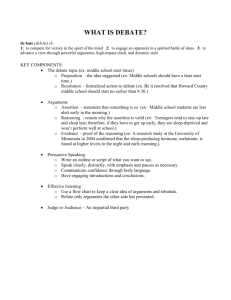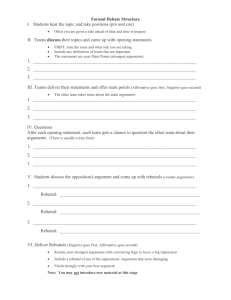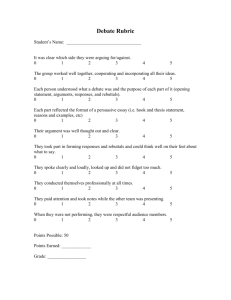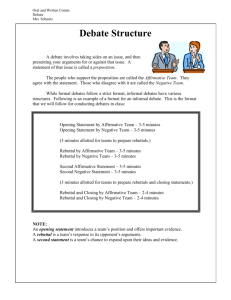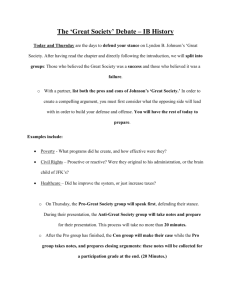Foundational Debating Skills Rachmat Nurcahyo, M.A. Workshop on Debating Poltek Andalas
advertisement
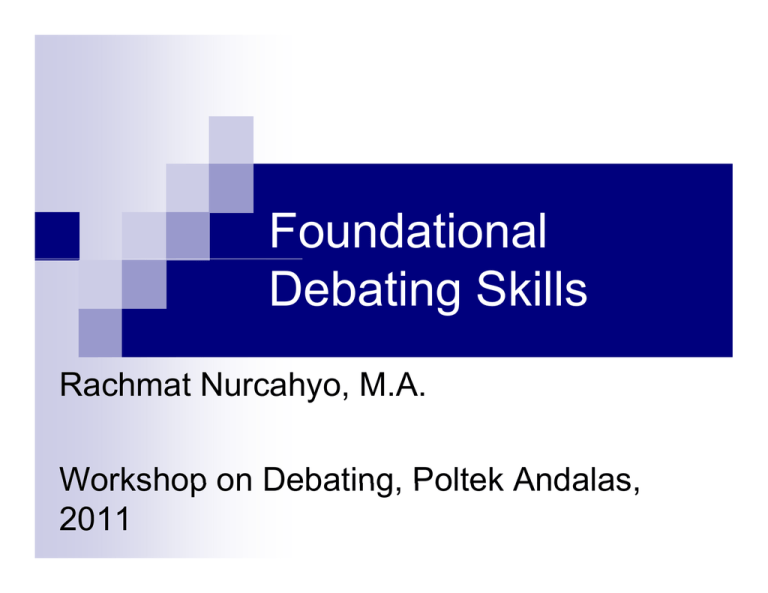
Foundational Debating Skills Rachmat Nurcahyo, M.A. Workshop on Debating Debating, Poltek Andalas Andalas, 2011 O Overview i What and why Debate? Formats M ti Motion Definition Opposition Options Arguments Rebuttal POI Speakers’ Roles D b t ? Debate? A clash of arguments Reasons behind sides To convince people Speak! S k! and d Listen! Li t ! Inspiring and Entertaining Wh D Why Debate b t to convince other people that his/her opinion p is better,, to listen to what other people think of an issue, issue to find which solution is the best for a problem, problem to win a trophy… F Formats t Australasian British Parliamentary Asian Style World W ld S School h lD Debating b ti Ch Championship i hi Etc M ti Motion Motions are full propositional statements that determine what a debate shall be about. In the debate debate, the Government Bench must argue to defend the motion while the Opposition Bench must argue to oppose it open motions e.g. g “this house believes that long g is better than short” semi-closed motions e.g. “this “thi h house would ld alter lt it its genetic ti code” d ” cclosed osed motions ot o s e.g. “this house would invade Sudan” TH Would Oblige Doctors to Report their Patients’ Domestic Violence to Police THBT Sport-Enhancing Drugs is not Harmful THBT green tax is an effective way to mitigate carbon emissions from large industries TH will urge the international community to sanction North Korea d fi i i definitions the definition should state the issue(s) for debate arising from the motion, motion stating the meaning of any terms in the motion which require interpretation Prime Minister/First Speaker should provide the definition at the beginning of his/her speech d fi i i definitions the definition must: (a) have a clear and logical link to the motion (b) not be self self-proving proving /truistic (c) not be time-set (d) not be place-set unfairly ( ) “clear (a) “ l and d llogical i l li link” k” average reasonable person would accept the link between motion and definition, as explained by the speaker semi-closed motions: treat the motion as an issue for debate e g “this e.g. this house would alter its genetic code code” closed motions: take stricter approach e.g. “this house would bomb Iraq” (b) self-proving lf i d definitions fi i i x should / should not be done, and there is no reasonable rebuttal e g “we’re e.g. we re going to argue that murder should be illegal” x is already the case, and so there is no reasonable rebuttal e g “we’re going to argue that the murder rate in e.g. the US is higher than in Scotland” (b) self-proving lf i d definitions fi i i “status quo” cases are not necessarily unreasonable e.g. “we’re going to argue that the European union should adopt the single currency” it’s a fair definition, because there is a reasonable rebuttal ( ) time (c) i setting i “...it’s 1936. You’re about to be introduced to Adolf Hitler, you’ve got a gun in your pocket, and you’re not particularly pleased to see him. We’re going to argue that you should h ld shoot h t hi him and d save millions illi off lives...” all debates must take place in the present (d) unfair f i place l setting i the members should debate the motion in p of the motion and the tournament the spirit have regard to the issue being debated have regard to the teams in the debate d fi i i definitional l challenges h ll the leader of the opposition may challenge the definition if it violates one of the four criteria above, and he should clearly state that he’s doing so. only the leader of the opposition may challenge the definition – no-one else the leader of the opposition should substitute an alternative definition d fi i i definitional l challenges h ll where the definition is unreasonable, the pp should substitute an alternative opposition definition that should be accepted by the j p provided it is not also adjudicator unreasonable. OPPOSITION’S OPTIONS Accept and Debate Challenge Broaden “Even “E If” A Arguments t Arguments explain why a point of view should be accepted. Good arguments are logical and relevant to the point being proven. They should also comprise of: f Assertion – the statement which should be proved p Reasoning – the reason why that statement is logical Evidence – examples/data that support the assertion and reasoning g above Link Back – the explanation of the relevance of this argument to the motion Motion women : That quota is not the answer for Definition : Putting a minimum limit of 30% seats for women in parliament is not the right solution to promote gender equality in society Assertion: because this kind of privilege will only strengthen the stigma in society that undermines women Reasoning: Nowadays there is still a strong stigma in society believing that women are inferior to men and has less capability than men. Reserved seats in the parliament will only strengthen this paradigm: that women can only sit in the parliament if they are facilitated but not because they can equally compete with men men. Thus justifying the wrong perception that women could not reach the same level as men unless given privilege. Evidence: In Uganda, public opinion that does not go in favor of women increased rapidly after the implementation of this kind of quota (this was also supported by some polling) Link Back: Quota for women in parliament will only strengthen the negative perception that undermines women, hindering the promotion of women being equal to men. Oth Argument Other A t Assertion: because forced quota could reduce the performance of these women and at the end impedes women’s movement for equality Reasoning: Due to many social resistance, women are still reluctant to involve themselves in politics. Women also lack the experience men have, given the limited history of women women’ss involvement in politics politics. Forcing women to fulfill the 30% quota opens probabilities of putting hesitant women with minimum experience in the parliament. This can reduce the working performance of those women. When such a thing happens, society would think that women are not as capable as their male counterparts while what actually happens is that women politicians are not yet well armed with the same motivation and experience as men. Evidence: In India, women representatives with no political background are less popular than their male counterparts Link Back: It is clear that rushing instant ways like putting a quota for women would harm the women movement for equality. REBUTTALS Rebuttals are responses towards the other team’s arguments. g Rebuttals should prove that the other team’s team s arguments are not as important as they claim to be be. In responding to the other team’s arguments, rebuttals could show that those arguments are: 1. Irrelevant to the point being proven For example: Claim : ”Prostitution should be banned because prostitution creates more porn sites in the Internet.” Rebuttal: “The number of porn sites in the Internet has nothing to do with whether prostitution is legalized or not. Fact is, porn sites could be accessed in many countries, apart from whether it legalizes prostitution or not” 2 Ill 2. Illogical i l For example: Claim : “Students should be allowed to smoke at school because it will create stronger resistance from passive smokers and eventually reduce the number of ssmokers o e s at school.” sc oo Rebuttal: “That is logically flawed because allowing students to smoke will create a permissive condition that would stimulate more students to smoke. smoke Fact is, is most teenagers start smoking because of peer influence. If school goes along with peer influence, then the reality that smoking is bad would be blurred and more students would think that smoking is ok and take up smoking.” 3 M 3. Morally ll flawed fl d For example: Claim : “The government should support death penalty because it will help d decrease th the population l ti off th the country.” t ” Rebuttal: “Killing people simply to d decrease population l ti iis morally ll wrong. People have the right to live and the government should not undermine that right only because they think they have too many citizens to manage.” manage. 4 Correct 4. Correct, but not important or involve unacceptable implications For example: Claim : “The government should ban MTV because there are some programs that are not related to music.” music. Rebuttal: “It is true that some MTV programs are not related to music, but the government should not ban a TV station simply because of that reason. Banning a TV station would lose the government a significant amount of revenue and it is more important to have this revenue rather than obliging TV stations to have programs that are true to its name.” 5. Based on an error of fact or an erroneous interpretation of fact For example: Claim: “Murder rates are rising g in the US. This is because some states have abolished capital punishment.” Possible Rebuttals: ” Murder rates are not rising in the US. Evidence shows that .. “ (direct factual error), or “If If the number of murders seems to be rising rising, it is because more murders are being reported compared to before. So, in reality it’s not actually rising.” (indirect factual error), or “Evidence shows that capital p p punishment – a statesanctioned murder – can appear to condone violent crime and leads to a rise in numbers of violent crime rather than reducing it.” (erroneous interpretation of fact) points i off iinformation f i first and last minutes of speech are protected time signal to indicate these points member offering POI should stand speaker may accept or decline points i off iinformation f i POIs should not exceed 15 seconds the speaker may ask the offering member to sit where the offeror has had a reasonable chance to be understood members should attempt to answer at least 2 POIs in their speech h there are no “points of order” or “points of personal privilege privilege” points i off iinformation f i may take any form the offeror wishes questions, i clarification, l ifi i ffacts, challenges, h ll rebuttal, even jokes POIs assessed as “matter” – see later S Speakers’ k ’R Roles l
